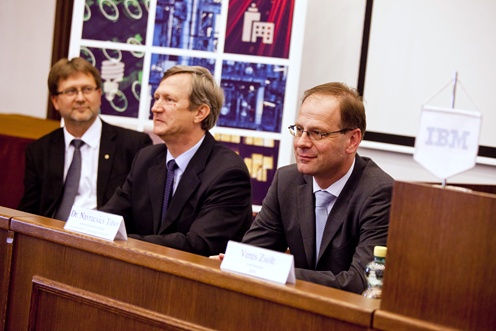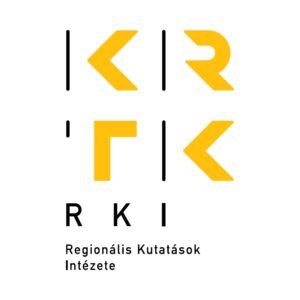Cooperation between science and the business sector – Smart cities in Hungary

Head of Institute Mihály Lados presented the study prepared by the Hungarian Academy of Sciences Centre for Regional Studies West Hungarian Research Institute titled „Smart cities” in the building of the Veszprém Academic Committee of Sciences on June 2, 2011. The press conference presenting the results of the research commissioned by IBM Hungary was opened by Minister of Public Administration and Justice Deputy Prime Minister Tibor Navracsics, dean of the University of Pannonia Faculty of Information Technology Ferenc Friedler and Zsolt Veres CEO of IBM Hungary.
Book presentation and conference in Moscow in the framework of the Russian programme of the Hungarian EU-presidency

The Centre for Regional Studies of Hungarian Academy of Sciences, in cooperation with the Institutes of Geography and Economics of the Russian Academy of Sciences, held a conference organised by the Hungarian Embassy in Moscow about perspectives of European regional cohesion policy and development directions of Russian regional policy on the 12th of May, 2011. The conference was opened by Ambassador István Íjgyártó and Academic Vladimir Kotljakov. Amongst others, the two scientific communities were represented by Sergej Artobolevskiy, Leonid Smirjagin, Olga Kuznetzova, Györgyi Barta, Gyula Horváth and Zoltán Hajdú who presented their views about certain scientific issues. Senior Advisor Wolfgang Streitenberger held a presentation about cohesion policy directions of the European Commission.
Regional universities as creators of an inter-state knowledge

The closing event of the project “UNIREG IMPULSE” of the Hungary-Croatia Cross Border Cooperation Programme 2007-2013 was held at the Main Hall of the Municipality of Baranya County in Pécs on the 4th of May, 2011. During the conference titled “The regional development role of universities”, besides the presentation of the general results and activities related to the programme, the four working groups (spatial and strategic planning, rural development, environmental protection, university knowledge transfer) also presented the theme-specific results and experiences of their 16-month-long research. The presentations of invited speakers sharing with participants their practical experiences and realisations further raised the standard of this event.
Results of the “NETINNOV” research

The conference titled „Innovation and cooperation – The impact of social networks on innovation” was organised at the Main Building of HAS in Budapest on the 14th of April, 2011. The organisers were the Regional Scientific Committee of the HAS and the West Hungarian Institute of the CRS of the HAS. The conference also served as the closing event of the research titled „The impact of social networks on innovation, territorial and sectoral disparities of economic cooperation in the domestic SME sector”. Besides the presentations related to the research topic held in the plenary session, the other objective of this event was the discussion of the major results of the two-year research and the presentation of a book with the same title summarising the results.
International conference on “Regional Transformation Processes in the Western Balkan Countries”

The Centre for Regional Studies of Hungarian Academy of Sciences, the Hungarian Regional Science Association and the Faculty of Business and Economics of the University of Pécs organise a Conference presenting the results of the research performed jointly by the Centre for Regional Studies of Hungarian Academy of Sciences and OECD to all those interested. English and Hungarian language volumes containing the research results will be released during the event. The objective of the free conference is the wide popularisation of the results and methodology of regional science. The conference aims to foster opportunities for discussion and dialogue among represenatives of Western Balkan countries, policy makers, researchers, students, tertiary education practitioners, professional associations, representatives of academic staff and other stakeholders.
Book on “Regional Transformation Processes in the Western Balkan Countries” published

The collapse of Yugoslavia added a new dimension to the problem of regional inequalities. Becoming former regions to independent states resulted in territorial changes. The disparities between smaller areas within the new countries became more apparent. Serious problems were posed by the new state organisation also. During the initial phases of the organisation of the new state formations, spatial aspects were obviously neglected. The book analyses the spatial structure of the countries of the Western Balkans as well as the factors contributing to this. It gives an overview of the more typical features of different periods in the transformation of the area, undertakes an evaluation of the effects of regional disparities and outlines the development perspectives for the region. The book is a result of the joint cooperation of the OECD LEED (Centre for Local Development) Trento and the Centre for Regional Studies of the Hungarian Academy of Sciences. The recently published book was edited by Gyula Horváth and Zoltán Hajdú.
The Central Transdanubia volume of the series “Regions of the Carpathian Basin” published

Central Transdanubia is the smallest NUTS2 region of Hungary with a population of 1.1 million. Even though the region’s population is declining in line with national trends, its rate is considerably lower. The destiny, history, current situation and future of Fejér, Veszprém and Komárom-Esztergom counties are all embedded in the process which led to the creation of Hungarian regional development and planning regions. Industry has an overwhelming weight in the economic structure of the region, with the highest number of employees. Among the main factors of successful transformation are the impacts of global economy and foreign direct investments, as well as dynamic industrial development. Foreign capital arriving in the region has undoubtedly contributed to modernisation of the economic structure, gaining access to foreign markets, and the international integration of the region. The eleventh volume of the series was edited by Viktória Szirmai.
Academic György Enyedi 80 years old

A book presentation in the Headquarters of the Hungarian Academy of Sciences was organised by our institute to celebrate the 80th birthday of our first Director General, György Enyedi academic on the 29th of September, 2010 in the Headquarters of the Hungarian Academy of Sciences. In honour of the founder of the Hungarian school of regional sciences, the researchers of CRS published a volume titled „The focal points of spatial research”. The authors reflect on the main themes of the wide research areas of György Enyedi in the following thematic units: declining and rising villages; urbanisation; cities in international arena; society, economy, public administration in spatial processes; social-spatial inequalities – spatial policy. Essays related to these themes reflect on studies of Enyedi and strive to continue his line of thought or occasionally to oppose it. The volume was written to appreciate and further develop his rich research activity. József Pálinkás, President of the HAS, Sectional President Ádám Török, Vice-President Miklós Maróth and the Director of CRS, Gyula Horváth spoke in approval of the internationally renowned scientific activity of György Enyedi, of the outstanding personal qualities of the school founder. Several members of HAS, renown figures of the Hungarian higher education and a multitude of students were present during this event.
Geographical Selections Without Borders from present-day hungarian and slovak papers on natural, social and economic geography.

A two-volume publication titled “Geographical selections without borders from present-day Hungarian papers on natural, social and economic geography” was published by the Centre for Regional Studies of the Hungarian Academy of Sciences and the Šafárik University of Košice. The anthology was prepared in the framework of a project titled “Let us learn from each other!” of the Hungarian and Slovak Cross Border Cooperation Programme 2007-2013. Project manager: István Mezei. The Slovak version was published simultaneously with the Hungarian volume in Kosice.
Annual Conference of the Regional Studies Association in Pécs

The leading scientific organisation of European regional science, Regional Studies Association (RSA) held its annual international conference in Pécs between May 24–26, 2010. The winning project proposal of the HAS Centre for Regional Studies about the organisation of the conference was selected in strong competition with five Western European cities proposals. Co-organisers of the conference were the Hungarian Regional Science Association and the Faculty of Business and Economics of the University of Pécs.


